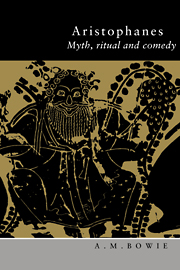Summary
Clouds is structurally similar to Wasps, in that once again an old man is subjected to various trials in an attempt to remedy an unsatisfactory circumstance, and in the process experiences a form of rejuvenation. At the same time, there are a number of important differences: in Wasps, the old man is apparently freed by this from all moral and political restraints; whereas in Clouds the folly of his attempts is borne in upon him with some force. Both plays use the ephebic mythos, but in Clouds there is woven into the text a series of commentaries on Strepsiades' actions which constantly suggest that he is not only reversing the natural pattern of the ephebeia but also contravening moral and religious rules that are fundamental to the well-being of the city. The moral disapproval implied by these commentaries can however be prevented from dominating the reading of the play by a consideration of the outcome from two perspectives and by attention to what Aristophanes has to say about himself in the parabasis. This chapter will begin with a discussion of Strepsiades' ephebic odyssey, before looking at the treatments of Socrates and the Cloud-Chorus, which together provide the frameworks through which Strepsiades' errors of choice are to be enjoyed.
Strepsiades' ephebeia
The prologue of the play can be analysed in terms similar to those found at the start of Wasps.
- Type
- Chapter
- Information
- AristophanesMyth, Ritual and Comedy, pp. 102 - 133Publisher: Cambridge University PressPrint publication year: 1993



